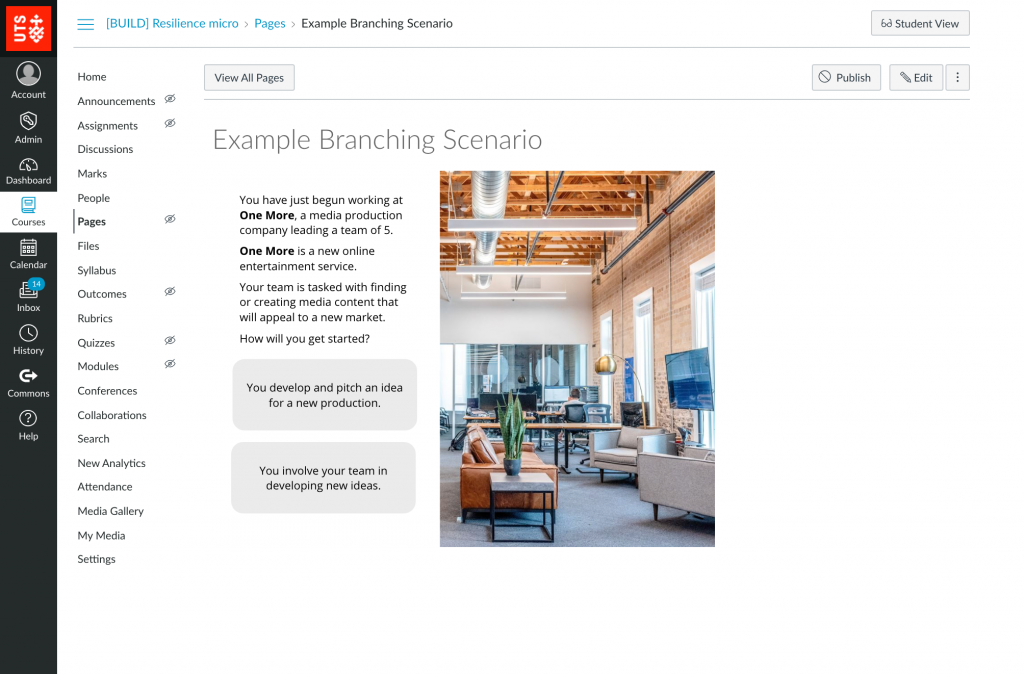The Postgraduate Learning Design (PGLD) team recently had the opportunity to take on three work placement interns from the UTS Graduate Certificate in Learning Design. The interns came from the subject Work: Learning Design Project. A key assessment in this subject involves students identifying a learning design opportunity within their own professional or personal context, or working in collaboration with UTS on a pre-defined learning design opportunity (10-20 hours of work for each student). With so many subjects being developed in our PGLD pipeline, it was easy to match all work placement interests with current projects.
Interactives: Marie-Claude & Jessy
Marie-Claude was new to learning design and was interested in exploring the use of interactives. We were in the process of creating a proof-of-concept module for a microcredential on Inclusive Practice and had an interactive for Marie-Claude to work on, using the tool Genial.ly. She also had to describe the learning sequence that the interactive would be part of.
With a brief from our learning designer Jessy Mai, Marie-Claude produced an impressive interactive with supporting resources and activities that fitted seamlessly into the module. Key design decisions for Marie-Claude were based on microlearning theory, specifically: contiguity (spatial and temporal), coherence and personalisation principles.

Working with the UTS postgraduate Learning Design team was an absolute joy. The team was supportive of my ideas and gave me good pointers to improve my design. Being able to work with the Learning Design team confirms that working in learning design is something that is not only achievable to me but something I could thrive in.
Marie-Claude
Analytics: Oscar & Keith
Oscar was an experienced learning designer and wanted to explore data analytics further. We provided him with a brief to examine a de-identified dataset of a subject he had recently completed. His brief involved considering the following questions from the dataset:
- Is there a correlation between participation (e.g. page views) and the final assessment results?
- Can the reports by themselves tell you how the course is going?
- What pages have the most and least student page views, and possible reasons for this?
- What could a learning designer do to possibly increase page views on less popular pages?
- What are the challenges when trying to make sense of the data from a teacher perspective?
- If a teacher downloaded the reports, are there easy ways of making sense of the data?
- Can the data be displayed in a more user-friendly way?
We organised for Oscar to meet with Keith Heggart, the coordinator of the subject to talk through his ideas and findings. With the dataset Oscar produced an impressive report of his analysis. He clearly articulated: overall performance, weekly activity, resource activity and limitations of the New Analytics feature reports in Canvas.

I would say that the subject was a carefully constructed blended learning experience and the Learning Design Project was a unique and fulfilling experience to explore real-world learning design.
Oscar
Branching scenarios: Jennifer & Ruby
Jennifer was interested in exploring features of the software Articulate Storyline. This interest fitted perfectly with a proof-of-concept ‘choose your own adventure’ interactive we were planning to create for a small subject on the topic of Resilience. Jennifer’s brief included a template our client had filled in with details of the branching scenario. Ruby Ramos, storyline guru from the PGLD Media team, took a mentor role as Jennifer produced an impressive artifact for our clients with a focus on multimedia cognitive load theory considerations.

Working with John and his PGLD team was a great experience. They provided a clear design brief to work with, and were available to answer questions. I enjoyed the challenge of working with Articulate Storyline and developing new learning design skills.
Jennifer
At the end of their work placement, students present their projects at a live Expression Session which covers:
- Their project brief and their proposed solution.
- How that fits with what they know about learning design. e.g. why did they do it that way?
- What they learned/ any changes they would make
This project is the pinnacle of the Graduate Certificate in Learning Design, and is such an important part of the course as a whole. The idea is that students have a chance to try out their LD skills ‘in the wild’, with real people and real projects. Of course, learning design is a broad field so there are lots of possibilities for different projects. I was really thrilled to see how the students were welcomed into the PGLD teams, and the fantastic results they produced!
Keith Heggart, Coordinator
The Graduate Certificate was designed to allow students to develop their knowledge about research-informed design in a ‘close-to-practice’ environment. While students engage in authentic assessment throughout the course, the project subject really promotes an internship-like experience to prepare students for employment in the field. We have a close partnership with the PGLD team who collaborated on the course from the very beginning so it is wonderful to see the students engage with the team in their final subject.
Sita Chopra, Director of SFL & PG coursework
For PGLD, it was a pleasure working with the UTS interns, and gave us a chance to talk about learning design with a new audience. We look forward to future learning design work placement interns!

It was a brilliant experience for the interns. Congratulations to the PGLD team for making it happen!